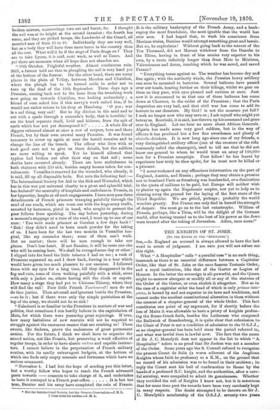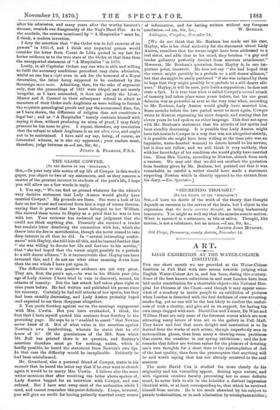THE KNIGHTS OF ST. JOHN.
[TO THE EDITOR OF THE SPECTATOR.")
SIR,—In England an accused is always allowed to have the last. word in arrest of judgment. I am sure you will not refuse me- this right.
What "A Hospitaller" calls "a parallel case" is no such thing, inasmuch as there is an essential difference between a Capitular,
Order, like that of St. John or the once famous Teutonic Order, and a royal institution, like that of the Garter or Legion of Honour. In the latter the sovereign is all-powerful, and the Queen.
mightto-morrow abrogate or modify all or any of the statutes of the Order of the Garter, or even abolish it altogether. Not so in the case of a capitular order the head of which is only primes inter pares, is bound by and not superior to its laws and traditions, and cannot make the smallest constitutional alteration in them without the consent of a chapter-general of the whole Order. This fact.
constitutes one point of my argument, for if shortly before the loss of Malta it was allowable to have a priory of knights profess- ing the Russo-Greek faith, besides the Lutherans who composed. the Bailiwick of Brandenburg, it is quite clear that submission to. the Chair of Peter is not a condition of admission to the 0.S.J.J., as no chapter-general has been held since the period referred to,. and what was lawful then is lawful now. The fact that the name
of Sir J. C. Meredyth does not appear in the list to which "A. Hospitaller" refers is no proof that Sir Joshua was not a member of the Order. Some years ago the S. Council refused to recognize- the present Count de Salle (a warm adherent of the Anglican Knights whose faith he professes) as a K.M., on the ground that no record of his admission was to be found in their archives ; in. reply the Count sent his bull of confirmation to Rome by the hands of a professed R.C. knight, and the authorities, after a care- ful scrutiny, were compelled to admit its genuineness. Whether they rectified the roll of Knights I know not, but it is notorious that for some time past the records have been very carelessly kept in many respects. The doubt attempted to be thrown on. Sir J. C. Meredyth's membership of the 0.S.J.J. seventy-two years.
after his admission, and many years after the worthy baronet's I deny the assertion that "the Order was in full exercise of its powers" in 1831-8, and I think any impartial person would consider the letter from Count de Litta quoted in my last far better evidence as to the true state of the Order at that time than the unsupported statement of "A Hospitaller" in 1870. Lastly, in all Capitalar Orders any one who is able and willing to fulfil the necessary conditions precedent may claim admission, whilst no one has a right even to ask for the bestowal of a Royal decoration, the latter being supposed to be conferred by the Sovereign mero mote. Admitting, then, for the sake of argument -only, that the proceedings of 1831 were illegal, and not merely irregular, as I have contended, it does not justify the Lieut.- Master and S. Council in their subsequent refusal to admit as emembers of their Order such Anglicans as were willing to furnish the requisite genealogical proofs and pay the accustomed dues, for, -as I have shown, the difference of religion does not constitute a iegal bar ; and as "A Hospitaller" merely contents himself with saying it does, without producing an atom of proof, I may fairly eresume he has none to give. I repeat, therefore, my conviction that the refusal to admit Anglicans is an act ultra vires, and ought not to be maintained. I have said my say, being, of course, an interested witness, as is also my opponent ; your readers must, -therefore, judge between us.—.I am, Sir, &c., JULIUS A. PEARSON, F.S.A.



































 Previous page
Previous page